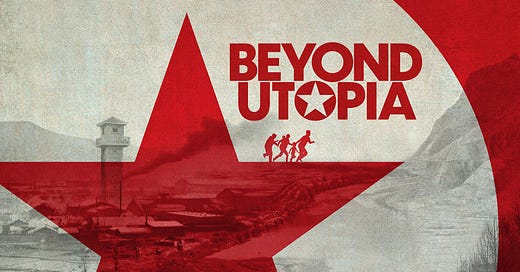Escaping North Korea
An interview with the Director and Producer of a new Bafta-nominated film
Beyond Utopia is a thrilling and moving documentary that follows the stories of people trying to escape from North Korea, with some graphic footage of the conditions they are fleeing. I was privileged to have an opportunity to interview Madeleine Gavin, who directed and edited the film, and one of the producers, Sue Mi Terry. Madeleine is an Emmy-nominated filmmaker who has edited many award-winning documentaries and received the 2024 Dupont-Columbia Journalist Award for excellence in journalism. Sue served in several government posts as an analyst of North Korea and East Asia, and is now Director of the Asia Program and the Hyundai Motor-Korea Foundation Center for Korean History and Public Policy.
The movie features Pastor Seungeun Kim, a key figure in the Underground Railroad for defectors from the North, and two attempted defections. In the first, Soyeon Lee, who escaped herself years earlier, tries to get her son out, without success. In the second, the five members of the Roh family have reached China and the film follows them in their dangerous journey through Vietnam and Laos before they reach Thailand and safety.
Beyond Utopia will be shown on BBC Four on Tuesday 30th January at 10pm. You can find a link to the trailer here.
Lawrence Freedman
Thank you very much for joining me. I wanted to start by asking about your choice of stories. You could have started, as I believe was the original intention, with the story of Hyeonseo Lee [who defected 20 years ago as described in her book Girl With Seven Names]. She was a high-profile defector, who gives Ted talks and so on. You could have just made it about Pastor Kim. In the end you chose two extraordinary and very different stories, one with the sad ending, one with a happy ending. But a happy one could have gone wrong. So I am wondering, in the course of making this did your view of the narrative arc change?
Madeleine Gavin
You're right, it did start out around Hyeonseo Lee, and from the beginning I knew that what I definitely wouldn't want to do is some kind of recreation of her defecting 20 years previously. I wanted to try and document something present tense and experiential, because we don't hear from the people of North Korea. There was such a gaping hole in terms of hearing those voices. And then I found this hidden camera footage which showed their lives inside North Korea.
But yes, initially there was a whole different potential arc to this film which started with me shooting with Hyeonseo. In that version of the film, the present tense story would have been more of a psychological thriller taking place in South Korea about what it's like to be the most high-profile defector in the world at the time, someone who had been targeted by the regime. Extremely successful, as you say, Ted talks and her memoir, and yet one of the most traumatized people I've known. Traumatized by what she went through in the fleeing of her country more than 20 years ago and the brutal cut-off from family in the process.
While I was shooting with Hyeonseo, I met Pastor Kim, and after many months getting to know each other, he and I decided to work together and to attempt to follow the next two escapes who contacted him. Those escapes were Soyeon and the Roh family, and those are the only escapes that we followed. And you’re right, either of those escapes could have gone differently. Additionally, because of the vast amount of story we had in the end, there was quite a process involved in finding the film you are seeing now. In order to use more of Hyeonseo’s story, at one point we thought about this as a series, and we thought about it as a two-part feature. Ultimately, we decided to focus largely on the two attempted escapes and to allow Hyeonseo to be the voice of memories of North Korea.
Sue Mi Terry
There was a high level of risk right from the start because, as you said, we had no idea how things were going to play out. We did not know one story was going to be happy and one was going to be a sad ending. The Roh family could have been captured at any point, be sent back and then there's no film or one that comes to an end very quickly. But I do think that’s what makes the film unique. I myself had participated as a pundit in other programmes talking about defectors and North Korea, but it’s a different experiencing seeing this play out.
Keep reading with a 7-day free trial
Subscribe to Comment is Freed to keep reading this post and get 7 days of free access to the full post archives.




